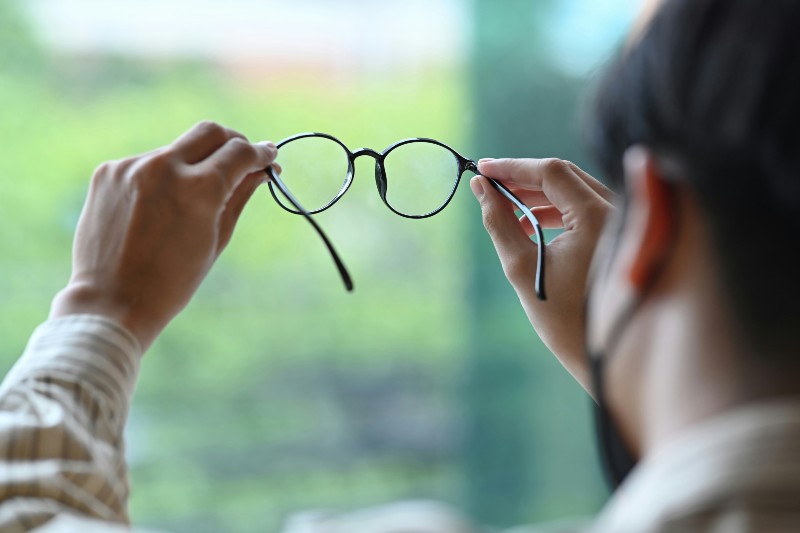If your glasses are always getting dirty, you’re probably familiar with the frustration of constantly cleaning them only to end up with smudged lenses moments later.
You’re not alone, and there are several reasons why this happens, ranging from natural skin oils to environmental factors.
Understanding these reasons can help you take better care of your eyewear and maintain clean lenses for clearer vision and less frequent cleaning.
7 Reasons Why Your Glasses Are Always Get Dirty
Glasses can get dirty for many reasons. It’s not always about forgetting to clean them or handling them too much. Sometimes, the reasons are out of your immediate control but knowing them can help you find better ways to keep your glasses clear and smudge-free.
1. Natural Oils from Your Skin
Our skin naturally produces oils to keep itself moisturized. However, these oils can easily transfer to your glasses’ lenses when you touch them or even from your face if your glasses sit too close to your skin. These oils are sticky and can attract more dirt and dust, leading to smudged and cloudy lenses.
2. Moisturizers, Lotions, and Other Products on Your Skin
If you use moisturizers, sunscreen, makeup, or hair products, chances are these can also contribute to your glasses getting dirty.
When you apply these products to your face or hair, they can easily transfer to your glasses, especially if you touch your face or adjust your glasses without washing your hands first. The residue left behind can create smudges that are difficult to clean without a proper lens cleaner.
3. Water Vapor
Water vapor, resulting from sweat, breath, and even changes in humidity, can condense on your glasses if they are cooler than the surrounding air. You can imagine a foggy effect can be created on the lenses, making it hard to see.
Those who wear glasses and masks have likely experienced this to a greater degree, as exhaled air often gets directed upwards onto the cooler surface of the glasses.
4. Glasses Don’t Fit Correctly
Another common issue that leads to glasses getting dirty is improper fit. If glasses are too loose, you may find yourself frequently pushing them up your nose. This not only transfers skin oils and products to your lenses but also increases the risk of scratching them.
Also, glasses that sit too close to your face may get smudges from eyelashes with every blink.
5. You Keep Touching Them in Everyday Handling
It’s an easy habit to form: pushing glasses up by the lenses, adjusting them from the front, or even just taking them off and putting them back on can transfer dirt and oil from your hands to the lenses.
Frequent handling is one of the most common reasons glasses get dirty quickly. Even the cleanest hands can carry natural oils or residue from anything you’ve touched, meaning each contact with your glasses can leave behind smudges or dirt.
6. Anti-reflex Coating
Older anti-reflex coatings on glasses were known to be more challenging to clean. These coatings could become statically charged, attracting dust and lint directly to the lens surface.
While modern coatings have improved, they can still present a cleaning challenge compared to non-coated lenses, especially if not cared for properly.
7. Dust
Dust is an ever-present factor in the environment, and it can accumulate on lenses just as it does on any other surface. Even when your glasses are resting, such as overnight, they’re collecting dust, which can form a film over the lenses that’s noticeable when you put your glasses on in the morning.
How to Keep Your Glasses From Getting So Dirty?
Recognizing why your glasses get dirty is the first step, the next is adopting practices that help keep them cleaner for longer. Here’s how to maintain clear vision and reduce the frequency of cleanings needed.
1. Thoroughly Wash Your Hands
Before you even think about touching your glasses, ensure your hands are clean. Washing your hands removes the oils, dirt, and residue that could smudge your lenses.
Use soap and water, and dry your hands thoroughly with a clean towel before handling your glasses. This simple step can significantly reduce how often your glasses get dirty.
2. Gently Rinse Glasses with Tap Water
Think of this step as prepping your glasses for a deeper clean. Start the cleaning process by gently rinsing your glasses with warm tap water, which helps to remove any dust or loose particles that could scratch the lenses during cleaning.
Stay away from using hot water as it might harm the lens coatings.
3. Put Dish Soap on Each Lens
After rinsing, put a tiny bit of mild soap without lotion on each lens. Dish soap is effective at breaking down oils and residue without harming the lens coatings. Ensure the soap is free of lotions or added moisturizers, as these can leave a film on your lenses.
4. Fully Rinse Frames and Lenses
Thoroughly rinse off the soap from both the frames and the lenses. Make sure all soap suds are gone, as remaining residue can cause smearing.
Pay special attention to the frame, especially the nose pads and the edges where the frame meets the lens, as these areas can trap soap and oils, leading to irritation and dirty lenses over time.
5. Dry Frames and Lenses with a Towel
After rinsing, use a clean, lint-free towel to gently pat the lenses and frame dry. Avoid materials that can leave behind fibers, as these can stick to the lenses and create smudges.
Microfiber cloths are ideal for this task because they’re designed to pick up oils and dust without scratching the surface or leaving residue. Be sure not to rub the lenses too hard, as this could potentially cause scratches.
6. Double-check for Any Remaining Smudges and Gently Clean Them Off
Once your glasses are dry, hold them up to the light to check for any remaining smudges or marks. If you find any, use a clean, dry section of your microfiber cloth to gently wipe them away.
Small, circular motions tend to be the most effective for removing stubborn smudges without spreading them further.
7. Don’t Use Clothes or Paper Towels to Dry
Avoid using your clothing, tissue paper, or paper towels to clean or dry your glasses. These materials can be abrasive and often leave behind scratches, lint, or even worse smudges on the lenses.
Even though it might seem convenient at the moment, the potential damage they can do to your glasses is not worth the risk.
8. Don’t Hand Wash and Dry Immediately
Letting your glasses air dry for a brief moment after washing and before gently patting them dry can be helpful. This method allows any residual water droplets to evaporate naturally, minimizing the potential for water spots, which can be as annoying as smudges. However, make sure the environment is clean, as drying in a dusty area can defeat the purpose.
Additional Tips for Keeping Your Glasses Clean
Maintaining clean glasses doesn’t stop with a good washing routine. Here are more tips to help you steer clear of lens smudges and dirt buildup:
Use a Protective Case
When you’re not wearing your glasses, keep them in a hard-shell case. This protects them from dust and accidental scratches and keeps them clean for longer periods.
Avoid Excessive Heat
High temperatures can damage the coating on your lenses, making them more prone to smudging. Avoid leaving your glasses in a car on a hot day or near heat sources.
Update Anti-reflective Coatings
If your glasses have an older anti-reflective coating that seems to attract smudges and dirt, consider upgrading your lenses. Modern coatings are designed to resist smudges and are much easier to clean. Your optometrist can advise on the best options available.
Use Proper Cleaning Solutions
While dish soap works well for regular cleaning, specialized lens cleaning solutions are formulated to care for your glasses without damaging them.
These solutions can be particularly useful for touch-ups throughout the day. Just spray a little on the lens and gently wipe with a microfiber cloth.
Regular Adjustments
Ensure your glasses fit correctly by having them adjusted regularly. Properly fitted glasses are less likely to slip down your nose, reducing the need to push them back up and thus minimizing smudges from your hands.
Limit Touching
Try to get into the habit of handling your glasses by the frame, specifically the arms, rather than the lenses. This will naturally reduce the amount of direct contact your lenses have with your fingers.
Keep a Cleaning Kit Handy
Having a small cleaning kit with a microfiber cloth and lens cleaner at your work desk, in your car, or in your bag ensures you can clean your glasses on the go. This way, if your lenses do get smudged or dirty, you’re prepared to deal with it immediately, rather than letting it build up over the day.
Consider Lens Coatings
Beyond anti-reflective coatings, there are other lens treatments designed to repel water, oil, and dust. These coatings can make a significant difference in keeping your lenses clean and clear for longer. Ask about your options the next time you purchase glasses.
Reduce Condensation
For those who experience lens fogging from wearing masks or moving between different temperatures, consider anti-fog wipes or sprays. These products can help minimize the condensation on your lenses, keeping your vision clear.
Regular Replacement
Lastly, understand that glasses have a life span. Over time, even with the best care, lenses can develop micro-scratches from cleaning and wear, which can make them seem dirtier quicker. Frames can also become bent or loose, affecting fit and increasing the need for adjustments.
Replacing your glasses as needed, based on your optometrist’s recommendation, ensures that your vision is not only clear but that your glasses remain as maintenance-free as possible.
Conclusion
If you can understand the common reasons why glasses get dirty often and employ a combination of preventative and proactive cleaning measures, you can enjoy clearer vision and reduce the time spent cleaning your lenses.
Now as you may know, taking care of your glasses is not just about cleaning; it’s about handling them correctly, protecting them when not in use, and choosing the right products and coatings that can extend the life and clarity of your lenses.





